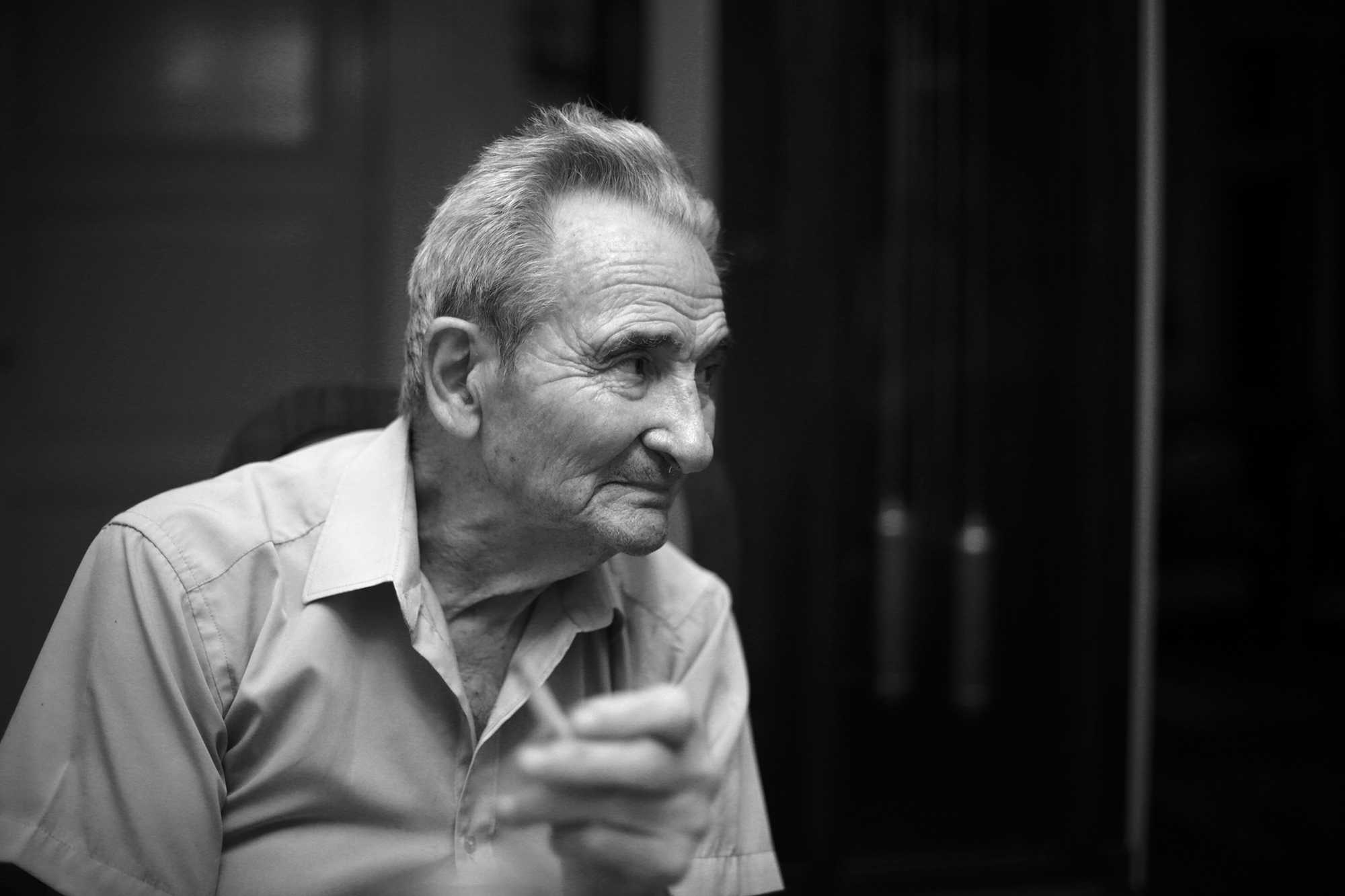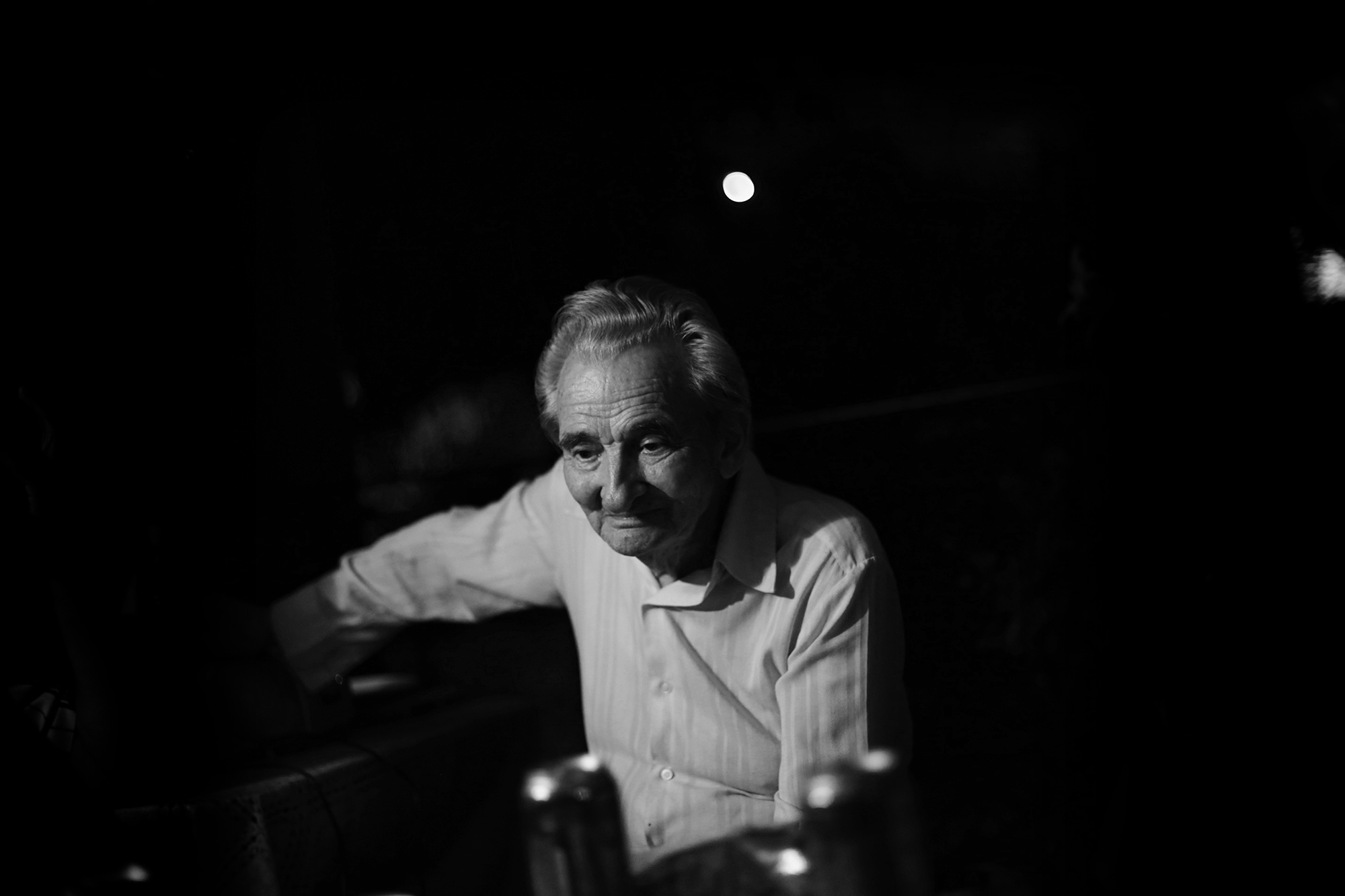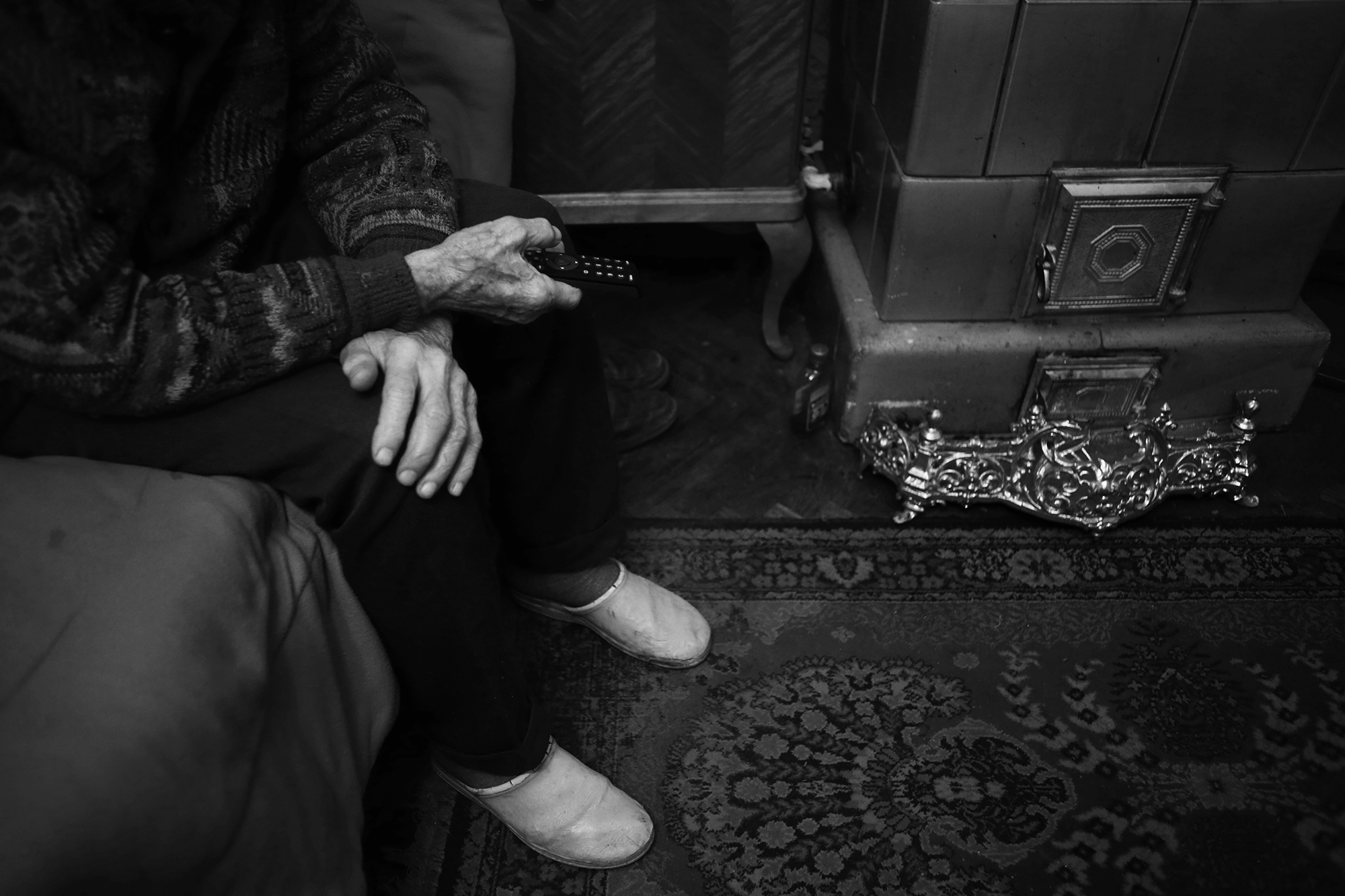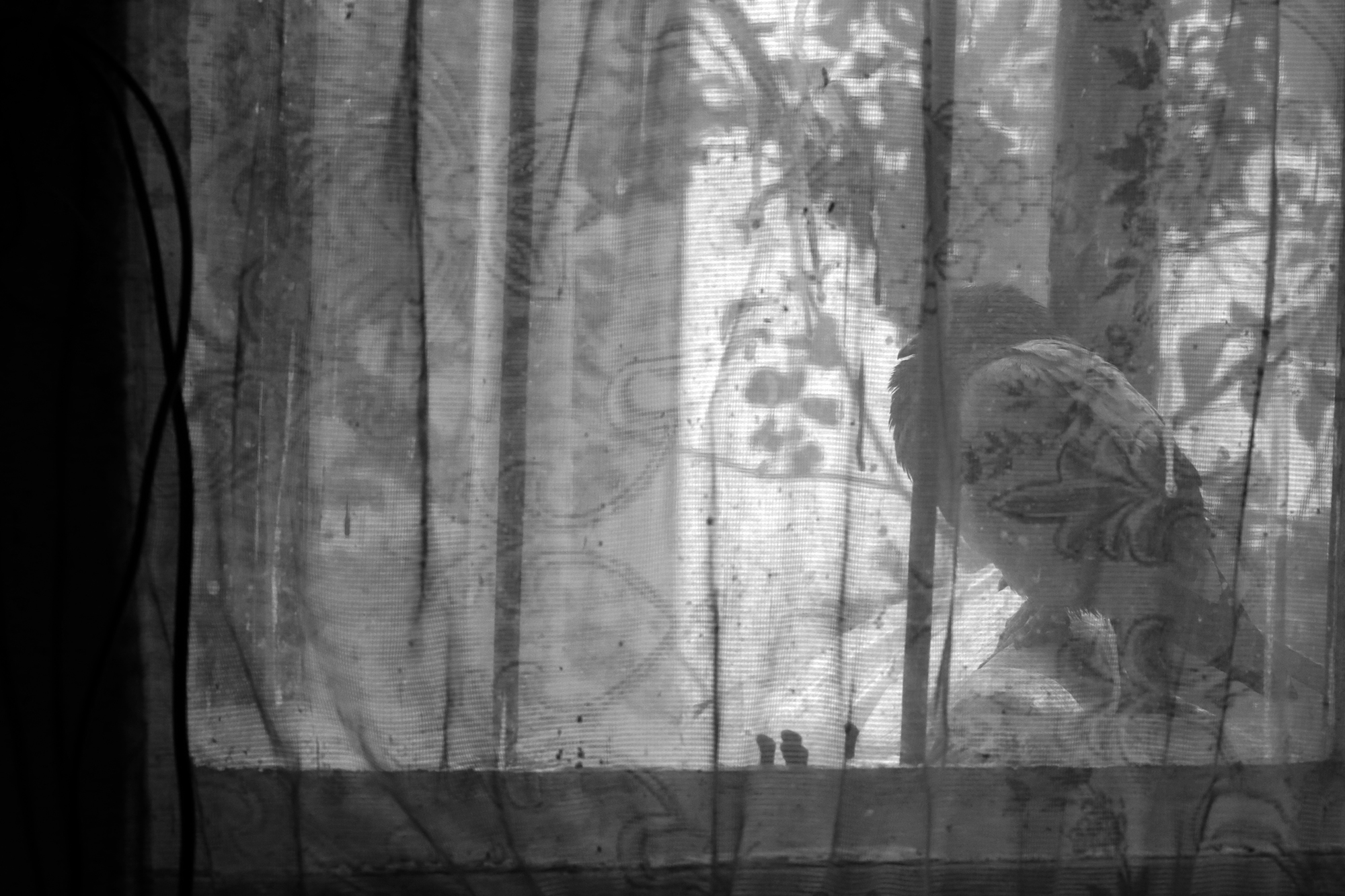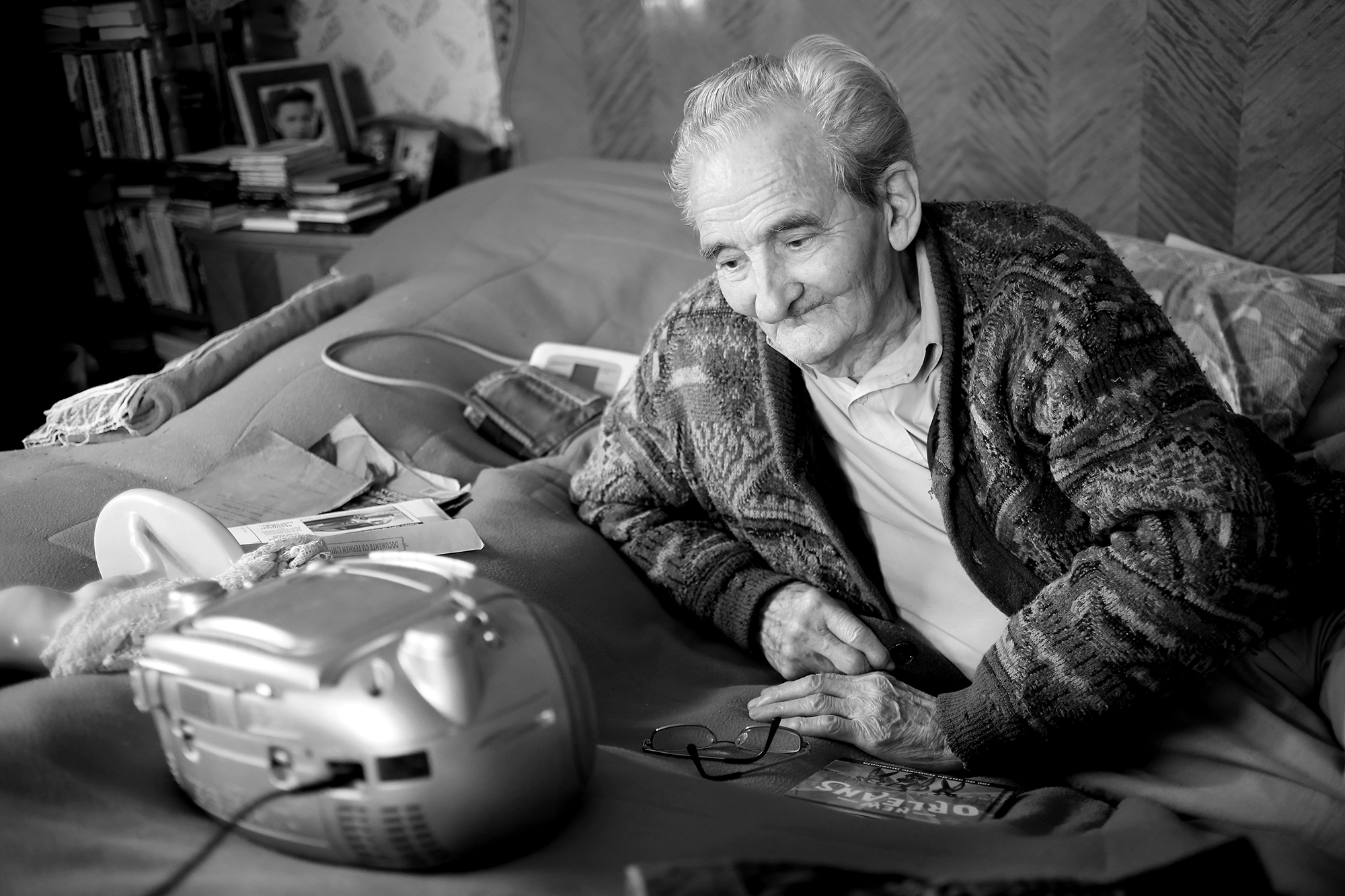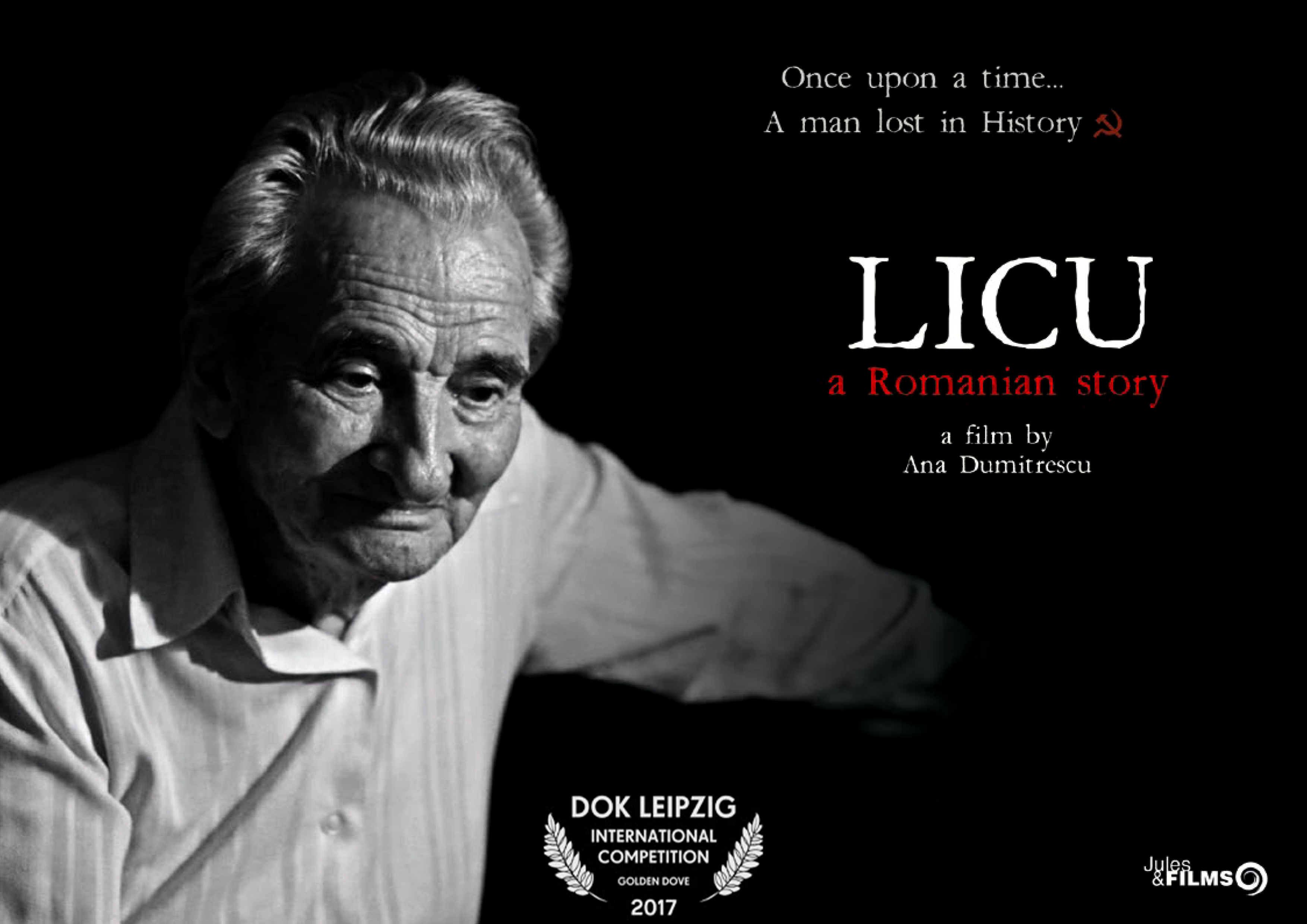Licu, a Romanian story
Licu, o poveste românească
Ana Dumitrescu
83 min (2017)
83 min (2017)
Feature documentary
- «Licu, a Romanian story» is about the life of a man lost in history. A 92-year-old man having outlived major historical events such as war, peace, communism, the revolution and post-revolution. He has suffered, loved, laughed and cried for over 92 years. Licu is a feature documentary, but above all it is a movie about the passing of time and old age. A reflection on our own condition and ephemerality.Licu’s story, like most stories, is subjective. It is not a movie about History but a tale whose Hero is named Licu. Each of us, at one moment or another, will identify with the events in the film.
Licu’s life-story could be anyone’s story. It radiates universality.
Licu’s story is filmed behind closed-doors. At his age, he has remained alone with his memories. However, the film is filled with characters and life. Loulou, his wife and the love of his life, is a lively presence. So is Viorel, his beloved brother, who passed away at the age of 37…
In the house, the surrounding objects are a constant presence and seem to become alive assuming the role of real characters. Each object is a character in itself: the house defying time, the pendulum that imitates the heartbeat, the television set that fills the silence...
Each sequence in the movie is conceived like a photograph in an album. Today will become tomorrow. The present has already become the past. Licu is an invitation to opening the book of time. Can you introduce us to your film, «Licu, a Romanian story» ?
“Licu,” my latest feature documentary, happens to be my first Romanian movie and the first film I have made with my film-production company “Jules et Films.”
I am French of Romanian origin and I have never lived in Romania beforehand, with the exception of a two-year photographic interlude I spent there since 2007 to 2009. I used to enjoy listening to my grandmother telling me those old-time stories. The Romania I have known is, in fact, the Romania I have learnt about from my father’s and grandmother’s memories. In a way, this movie is a reflection of my own memories as a child when I was listening to those stories about a world I had never known. A movie made of memories. It is about a world depicted from my personal perspective through the eyes of those who had lived it in their own way. I have always enjoyed listening to the others telling me their stories and browsing through old-epoch photos. For me, this film is somehow like Proust’s Madeleine.
Coming back to the film - it is the story of a life, a 92-year-old man’s life who tells us his little story within the big story. It is like an ode to time passing-by, to his life, to our lives. It is a movie filled with dialogue, and seemingly time is flowing slowly. This is the paradox that ultimately reflects life itself. Life passes too fast, gets occupied with lots of events and yet time seems suspended or in slow motion.How did you meet Licu, the character portrayed in your movie?
Producer’s secret. I would just say that a part of his story is a part of me as well.What is the part of yourself in the character you are portraying?
My films are subjective. They necessarily pass through the filter of my own vision. “Licu,” I would say is a double subjective film as it passes first through the filter of the character’s memories and then through my own filter. For instance, the film takes place behind closed-doors in the character’s home. This was a fully assumed choice. I could have filmed him while doing grocery shopping or driving his car (he was still driving at that time) but I decided to unfold the action behind ‘closed-doors’, making it in its turn a character as well. This generation of a “certain age” or let’s put it as the older-aged persons, did not seem to enjoy going out that much. For instance, I never managed to have my grandmother accept my invitations to dine out together; maybe with one exception, once only, when we went to the mountains together. Thus, my own memories are to a certain extent behind closed-doors. And here’s again Proust’s Madeleine, which we were talking about earlier. Memories are like some sort of confession. It’s an intimate moment.
While editing the film, I chose to keep certain sequences and remove others, as it was not my intention to make a ‘personal-themed film’, but a universal one. I put the emphasis on the elements that can be cross-referenced with History.Can your film be rated as a «historical» film?
It is the story of a man who has crossed through history in spite of himself. After all, who does really choose to live through wars or dictatorships? It’s rather History crossing us if not piercing us. His vision is his own personal vision. It’s not about History; it is his history. In the end, after having watched the film, one realizes that he was at no moment an active actor in the course of History. He was caught in the grip of a war followed by a long dictatorial regime which in its turn, after long-lived expectations, would give rise to a disappointing regime. And like many Romanians he idealizes his childhood, the pre-war era. The difference lies in the fact that he did actually live that period while the others have only memories from their grandparents’ stories.
This nationalistic romanticism felt for that period is a common feature within Romania’s present social context. The era before the Second World War is perceived like a sort of a mythical Eden. The truth is certainly somehow more mitigated. However we should not overlook that Licu was born in a middle-class family. And the pre-war era had been prosperous for the middle-class. I would also mention that ultimately, in spite of the common belief, the communism was not as difficult a period as one might have imagined. Of course, there were the purges during the 50s which was undeniably a terrible period having struck mostly the intellectuals. Later on, the middle class which he belonged to as an engineer, enjoyed privileged positions. The engineers were regarded as assets to the government for their input in the modernization projects. In conclusion, nothing is really black or white. Everyone experienced and lived the pre-war and the communist periods differently according to their status in the society at that time. Thus, this movie without being a historical film in the strict sense of the term, exposes the character’s views which do match the views of many Romanians today. It is therefore a case study, yet a representative film.Before turning to the documentary cinema, you used to work as a photojournalist. Can you explain this turning point? Is there any trace of this first profession left in your present work as a filmmaker? Are you still a photographer?
I started with documentary photography on various subjects such as homosexuality in Romania or the deportation of Roma during the war. I have always enjoyed dealing with my subjects in depth, taking the time to photograph and getting to know the people; therefore, we cannot really talk about a transition to documentary but rather a change of support, from photography to the «animated» image. Technological changes have facilitated this transition (like the filming camera). Today I hardly do any photos, but photography serves me on a daily basis. I have evolved to more advanced techniques, and a particular attention is paid to the light. I tend to make each shot look like a photograph.Do you consider yourself an «engaged» filmmaker?
I consider myself a humanist. I really love the others, and that’s why I enjoy filming them. I could not film or make a movie about people or ideas I dislike, or do not have respect for. All my films have one thing in common: they talk about tolerance, respect, human values. Cinema is a powerful engine involved in the progress of society. It deals with a variety of topics casting different views and perspectives on situations often ignored. So, yes, like many other filmmakers, I am dedicated to our common humanistic values. Isn’t this the very motivation that stands at the core of why we are making films?- DOK Leipzig 2017 (Germany) / Golden Dove International Competition
Cronograf 2019 (Chișinău, Moldova) / Prize I - CadRO
Nomination "Best Documentary" - GOPO Prize 2019 (Romania)
Nomination "Best Documentary" - Gala UCIN 2019 (Romania)
Krakow Film Festival 2018 (Poland)
ZagrebDox 2018 (Croatia)
Solidarity Tel-Aviv 2018 (Israel)
CineDoc Tbilissi 2018 (Georgia)
Make Dox 2018 (Macedonia)
Free Zone 2018 (Serbia)
Making Waves 2018 (New-York, USA)
Forum des Images / Saison France-Roumanie 2019 (Paris, France)
The Rise of Eastern Culture/ Another Dimension - Festival din Białystok 2018 (Poland)
TIFF - Transilvania International Film Festival 2018 (Cluj-Napoca, Romania)
One World Romania 2018 (Bucarest, Romania)
Serile Filmului Romanesc 2018 (Iasi, Romania)
Astra Film Festival 2018 (Sibiu, Romania)
Festival de Film si istorie 2019 (Rasnov, Romania)
(…) Director: Ana Dumitrescu
Cinematography: Ana Dumitrescu
Sound: Jonathan Boissay
Editing: Ana Dumitrescu
Sound Editing: Jonathan Boissay
Sound mix: Mathieu Nappez
Cast: Liviu Canter
Production: Jules et Films
Romania • 2017 • 83 min • Black and White • Scope 2:35 • DCP 2K • Sound 5.1 Romanian
French / English subtitles availables
French distribution: BarProd-
![]()
VOD

USA / United Kingdom
© 2024 - Jules et Films SRL - social capital: 315,000 RON (63.000 EUR) - Romanian cinematography registry nr. 1301/08.03.2017
This website is published by :
Jules et Films SRL
SRL with a capital of 315,000 RON (63.000 EUR)
Calea Dumbrăvii, nr.47
Sibiu, Judet Sibiu, România
Com. Reg. J32/1492/2016 - Fiscal Code RO36815161
Romanian cinematography registry nr. 1301/08.03.2017
Contact
contact@julesetfilms.com
Responsible for publication :
Ana Dumitrescu, administrator
Jonathan Boissay, administrator
Hosted by
OVH SAS
SAS au capital de 10 174 560 €
RCS Lille Métropole 424 761 419 00045
Code APE 2620Z
N° TVA : FR 22 424 761 419
Siège social : 2 rue Kellermann - 59100 Roubaix - France
For any comments or requests for information concerning the operation of the site, please contact the following address: contact@julesetfilms.com
COPYRIGHT AND INTELLECTUAL PROPERTY
The content (text, photos, images and sound) of this site is the property of Jules et Films. Any reproduction, in whole or in part, and any representation of the substantial content of this site, of one or more of its components, by any process whatsoever, without the express written permission of Jules et Films, is prohibited, and constitutes an infringement punishable by Law.
The information, pictograms, photographs, images, texts, video sequences, animated, with or without sound, and other documents on the website are protected by industrial property rights and / or intellectual, either that BarProd is the owner, or it is authorized to reproduce and represent.
As such, any reproduction, representation or use of these documents is strictly prohibited.
GPDR
Jules et Films undertakes to ensure that the collection and processing of your data carried out from this website complies with the General Data Protection Regulation (GDPR).
You have the right to access, rectify, erase, restrict and object to the use of your data. You can exercise this right by sending an email to: contact@julesetfilms.com
TRACKERS AND COOKIES
Three types of cookies are used on julesetfilms.com:
Internal cookies necessary for the website to function
These cookies enable the website to function optimally. You can object to them and delete them using your browser settings, but your user experience may be degraded.
Audience measurement cookies
In order to better serve you and improve the user experience on our site, we measure its audience using a solution that employs cookie technology. The data collected is used solely to provide anonymous statistical data on traffic (number of page views, number of visits, frequency of return visits, etc.).
These features use third-party cookies that are placed directly by these services.
When you first visit our site, a banner informs you of the presence of these cookies and invites you to indicate your choice. They are only placed if you accept them. You can find out more and configure your cookies to accept or refuse them at any time by going to the Cookie Management page (link at the bottom left of each page of the site). You can indicate your preference either globally for the site or service by service.
How to refuse cookies via your browser
You can choose to disable all cookies at any time, even those necessary for the website to function. However, this may affect your user experience. If you only want to disable cookies that are not essential to the functioning of the website, use our cookie management tool.
Jules et Films SRL
SRL with a capital of 315,000 RON (63.000 EUR)
Calea Dumbrăvii, nr.47
Sibiu, Judet Sibiu, România
Com. Reg. J32/1492/2016 - Fiscal Code RO36815161
Romanian cinematography registry nr. 1301/08.03.2017
Contact
contact@julesetfilms.com
Responsible for publication :
Ana Dumitrescu, administrator
Jonathan Boissay, administrator
Hosted by
OVH SAS
SAS au capital de 10 174 560 €
RCS Lille Métropole 424 761 419 00045
Code APE 2620Z
N° TVA : FR 22 424 761 419
Siège social : 2 rue Kellermann - 59100 Roubaix - France
For any comments or requests for information concerning the operation of the site, please contact the following address: contact@julesetfilms.com
COPYRIGHT AND INTELLECTUAL PROPERTY
The content (text, photos, images and sound) of this site is the property of Jules et Films. Any reproduction, in whole or in part, and any representation of the substantial content of this site, of one or more of its components, by any process whatsoever, without the express written permission of Jules et Films, is prohibited, and constitutes an infringement punishable by Law.
The information, pictograms, photographs, images, texts, video sequences, animated, with or without sound, and other documents on the website are protected by industrial property rights and / or intellectual, either that BarProd is the owner, or it is authorized to reproduce and represent.
As such, any reproduction, representation or use of these documents is strictly prohibited.
GPDR
Jules et Films undertakes to ensure that the collection and processing of your data carried out from this website complies with the General Data Protection Regulation (GDPR).
You have the right to access, rectify, erase, restrict and object to the use of your data. You can exercise this right by sending an email to: contact@julesetfilms.com
TRACKERS AND COOKIES
Three types of cookies are used on julesetfilms.com:
Internal cookies necessary for the website to function
These cookies enable the website to function optimally. You can object to them and delete them using your browser settings, but your user experience may be degraded.
Audience measurement cookies
In order to better serve you and improve the user experience on our site, we measure its audience using a solution that employs cookie technology. The data collected is used solely to provide anonymous statistical data on traffic (number of page views, number of visits, frequency of return visits, etc.).
These features use third-party cookies that are placed directly by these services.
When you first visit our site, a banner informs you of the presence of these cookies and invites you to indicate your choice. They are only placed if you accept them. You can find out more and configure your cookies to accept or refuse them at any time by going to the Cookie Management page (link at the bottom left of each page of the site). You can indicate your preference either globally for the site or service by service.
How to refuse cookies via your browser
You can choose to disable all cookies at any time, even those necessary for the website to function. However, this may affect your user experience. If you only want to disable cookies that are not essential to the functioning of the website, use our cookie management tool.
